Fasteners
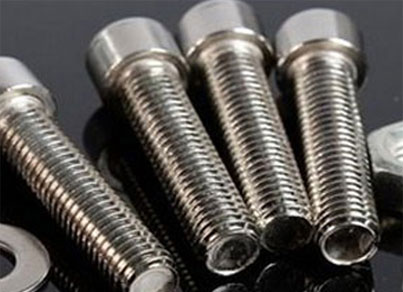
Nickel Alloy Fasteners
Alloy Pipe Impex offer a far reaching scope of nickel fasteners produced utilizing propelled
innovation to ensure exactness in configuration. These fasteners are generally utilized for
gathering different machines, parts and components. Our scope of nickel fasteners can be
customised according to drawings and specifications given by the customers.
Item Code: 7219
Port Of Dispatch: Any
Production Capacity: Ready Stock
Packaging Details: As Per Customer Requirment
| Specification | EN Standard | Grade | Chemical Composition | Description |
|---|---|---|---|---|
| Nickel 200 | EN 2.4060 | UNS N02200 | Ni: Balance, Cr: 0.0%, Mn: 0.35%, Fe: 0.4%, Si: 0.0%, Cu: 0.0%, C: 0.15% max | Pure nickel with excellent corrosion resistance and good mechanical properties. Used in chemical processing and food handling. |
| Nickel 201 | EN 2.4061 | UNS N02201 | Ni: Balance, Cr: 0.0%, Mn: 0.3%, Fe: 0.4%, Si: 0.0%, Cu: 0.0%, C: 0.02% max | Similar to Nickel 200 but with lower carbon content, improving its resistance to oxidation. Suitable for high-temperature applications. |
| Nickel 270 | EN 2.4050 | UNS N02270 | Ni: Balance, Cr: 0.0%, Mn: 1.0%, Fe: 1.5%, Si: 0.0%, Cu: 0.0%, C: 0.15% max | Nickel-copper alloy with good corrosion resistance and excellent mechanical properties. Used in marine and chemical environments. |
| Nickel 500 | EN 2.4953 | UNS N05500 | Ni: Balance, Cr: 0.0%, Mn: 0.0%, Fe: 2.0%, Si: 0.0%, Cu: 0.0%, C: 0.20% max | Nickel-copper alloy with high strength and good resistance to stress corrosion cracking. Used in aerospace and marine applications. |
| Nickel 600 | EN 2.4816 | UNS N06600 | Ni: Balance, Cr: 14.0-17.0%, Fe: 6.0-10.0%, Mn: 1.0%, Si: 0.5%, C: 0.15% max | Nickel-chromium alloy with excellent oxidation and corrosion resistance. Suitable for high-temperature environments. |
| Nickel 625 | EN 2.4856 | UNS N06625 | Ni: Balance, Cr: 20.0-23.0%, Mo: 8.0-10.0%, Fe: 5.0%, Nb: 3.15-4.15%, C: 0.10% max | Nickel-chromium-molybdenum alloy with outstanding fatigue and thermal-fatigue strength. Used in aerospace and marine applications. |
| Nickel 718 | EN 2.4668 | UNS N07718 | Ni: Balance, Cr: 17.0-21.0%, Mo: 2.8-3.3%, Fe: 18.0%, Nb: 4.75-5.50%, Al: 0.2-0.8% | Nickel-chromium alloy with high strength and resistance to oxidation. Commonly used in gas turbines and aerospace components. |
| Nickel 825 | EN 2.4858 | UNS N08825 | Ni: Balance, Cr: 19.0-23.0%, Mo: 2.5-3.5%, Fe: 42.0-46.0%, Cu: 1.0%, C: 0.05% max | Nickel-iron-chromium alloy with excellent resistance to corrosion and oxidation. Used in chemical processing and pollution control. |
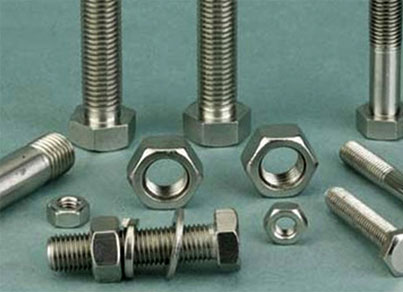
Monel Fasteners
Monel is the common name for a group of nickel alloys. They have nickel up to 67% and other elements in the composition. As a leading Monel Fasteners manufacturer Micro Metals produces the fasteners in different grades and specifications. The Monel 400 Bolts Nuts are one grade of the monel group. There are monel 400, 401, 404, 405, 450, K-500, R-405 and 502. The Monel 400 has good corrosion resistance, high strength and resistance to acidic and alkaline conditions. The UNS N04400 Bolts can operate up to 538% degrees Celsius. The specification is ASTM F467 and the fastener dimensions range with the standards.
The size length of the Nickel Alloy 400 Hex Bolt ranges from 3mm to 200mm and M02 to M33. The material composition has 63% nickel, silicon, carbon, sulfur, 28% copper, iron and manganese. The Monel 400 Stud Bolts are used in high temperature applications such as acidic, chemical and harsh environments in power, petroleum, chemical, petrochemical and other industrial applications.
The Monel Bolts have good strength with 345MPa minimum yield strength and 620MPa minimum tensile strength. There are different types of fasteners such as bolts, nuts, cap screws, socket cap screws, studs, hex bolts, UNS N04400 Threaded Rod and other types. When the applications don’t allow for nuts and welding, the materials and components can be fastened with the screws. ASTM F467 400 Monel Screws have different types of threads. The different thread types are useful in applications with different torque values for fasteners. Please feel free to contact us for more information on the Monel 400 Fasteners and pricing.
| Specification | EN Standard | Grade | Chemical Composition | Description |
|---|---|---|---|---|
| Monel 400 | EN 2.4360 | UNS N04400 | Ni: 63.0-70.0%, Cu: 28.0-34.0%, Fe: 2.5% max, Mn: 2.0% max, Si: 0.5% max, C: 0.3% max | Nickel-copper alloy with excellent resistance to seawater, acids, and alkalis. Used in marine and chemical applications. |
| Monel K500 | EN 2.4375 | UNS N05500 | Ni: 63.0-70.0%, Cu: 27.0-33.0%, Fe: 2.0% max, Mn: 1.5% max, Si: 0.5% max, C: 0.25% max, Al: 2.3-3.15%, Ti: 0.35-0.85% | Nickel-copper alloy with added strength and hardness. Provides superior performance in marine and oil & gas environments. |
| Monel R405 | EN 2.4675 | UNS N04405 | Ni: 63.0-70.0%, Cu: 27.0-33.0%, Fe: 2.0% max, Mn: 1.5% max, Si: 0.5% max, C: 0.3% max, Pb: 0.5% max | Nickel-copper alloy with improved machinability due to lead content. Used in applications requiring precision machining. |
| Monel 401 | EN 2.4320 | UNS N04001 | Ni: 63.0-70.0%, Cu: 28.0-34.0%, Fe: 2.0% max, Mn: 2.0% max, Si: 0.5% max, C: 0.3% max | Nickel-copper alloy with good general corrosion resistance, similar to Monel 400 but slightly higher in iron and carbon content. |
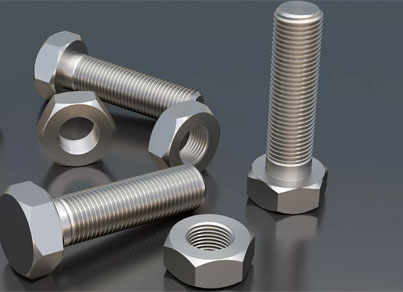
Inconel Fasteners
Inconel 600 Bolts Nuts are made up of a material with carbon, manganese, silicon, 6% iron, sulfur, 14% chromium, copper and 72% nickel in the composition. So it is essentially a nickel chromium alloy. Micro Metal is a leading Inconel Fasteners manufacturer and we produce the fasteners in different types, shapes and sizes. The material has higher mechanical properties with 340MPa minimum yield strength and 655MPa minimum tensile strength.
The Inconel 600 Bolts and Nuts belong to ASTM B166 specification.
There are different standards covering the different dimensions of the fasteners. The length of the Nickel Alloy 600 Screws range from 3mm to 200mm. Screws are used in applications where the use of bolts and nuts are not possible. There are different types of screws as well. There are UNS N06600 Stud Bolt types which range in thickness from 3/6 inches to 2 inches or M3 through M56.
The fasteners could be prone to stress corrosion cracking in concentrated and hot caustic alkalis. But the Inconel 600 Hex Bolt can withstand steam, air, carbon dioxide and the mixtures of these ingredients. The material is resistant against salt water, exhaust gases and organic acids. The fasteners such as the Inconel 600 Threaded Rod can be hardened by cold working and these are used in some of the high performance applications. Please contact us to know more about the different types of fasteners such as the Inconel Socket Head Cap Screws and other types along with prices.
| Specification | EN Standard | Grade | Chemical Composition | Description |
|---|---|---|---|---|
| Inconel 600 | EN 2.4816 | UNS N06600 | Ni: Balance, Cr: 14.0-17.0%, Fe: 6.0-10.0%, Mn: 1.0%, Si: 0.5%, C: 0.15% max | Nickel-chromium alloy with excellent oxidation and corrosion resistance. Suitable for high-temperature environments. |
| Inconel 625 | EN 2.4856 | UNS N06625 | Ni: Balance, Cr: 20.0-23.0%, Mo: 8.0-10.0%, Fe: 5.0%, Nb: 3.15-4.15%, C: 0.10% max | Nickel-chromium-molybdenum alloy with outstanding fatigue and thermal-fatigue strength. Used in aerospace and marine applications. |
| Inconel 718 | EN 2.4668 | UNS N07718 | Ni: Balance, Cr: 17.0-21.0%, Mo: 2.8-3.3%, Fe: 18.0%, Nb: 4.75-5.50%, Al: 0.2-0.8% | Nickel-chromium alloy with high strength and resistance to oxidation. Commonly used in gas turbines and aerospace components. |
| Inconel X-750 | EN 2.4665 | UNS N07750 | Ni: Balance, Cr: 14.0-17.0%, Mo: 0.0%, Fe: 3.0-7.0%, Nb: 0.3-0.6%, Ti: 2.5-3.5% | Nickel-chromium alloy with excellent creep and rupture strength. Used in high-temperature industrial applications. |
| Inconel 825 | EN 2.4858 | UNS N08825 | Ni: Balance, Cr: 19.0-23.0%, Mo: 2.5-3.5%, Fe: 42.0-46.0%, Cu: 1.0%, C: 0.05% max | Nickel-iron-chromium alloy with excellent resistance to corrosion and oxidation. Used in chemical processing and pollution control. |
| Inconel 600H | EN 2.4816 | UNS N06600 | Ni: Balance, Cr: 14.0-17.0%, Fe: 6.0-10.0%, Mn: 1.0%, Si: 0.5%, C: 0.10% max | A high-carbon version of Inconel 600 with enhanced strength and oxidation resistance. Suitable for high-temperature service. |
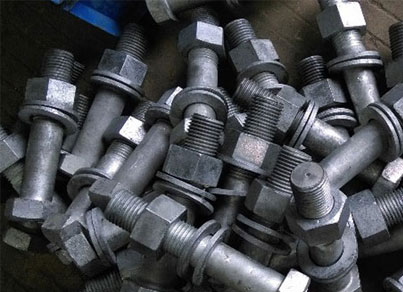
Hastelloy Fasteners
Hastelloy C276 Bolts Nuts are made up of a nickel molybdenum chromium alloy that is produced as a wrought material. These are some of the most versatile alloy material made fasteners on the planet. Micro Metals is a leading Hastelloy Fasteners manufacturer and we produce the fasteners in different types, sizes and dimensions. The material has minimum yield strength of up to 379MPa and minimum tensile strength up to 758MPa with elongation rate up to 60.
The Hastelloy C276 Bolts and Nuts can be used in harsh and upset environments such as acidic, basic, brackish and salt water environments. The hastelloy c276 hex bolts are used in acetic acid, and organic acid production plants. The material has excellent acidic resistance to strong oxidizers. The Alloy c276 stud bolts can withstand ferric chlorides and cupric chlorides as well. The material has cobalt, tungsten, iron, silicon, manganese, carbon and vanadium in the composition as well. Because of this specific combination, the C276 Hastelloy Screws also have very high pitting and crevice corrosion resistance.
The specification for this special grade of fasteners is ASTM B574. There are different dimensions according to the different standards of the ASTM B574 UNS N10276 Fasteners. They can come in 3mm to 200mm length, M3 to M56 sizes or 3/6 inches to 2 inches thickness. There are different types of bolts, nuts, screws, studs and others such as Hastelloy C276 Socket Head Cap Screws and more. The applications vary greatly as offshore oil drilling, power generation, petrochemicals, gas processing, specialty chemicals, pharmaceuticals, chemicals, sea water applications, heat exchangers, condensers and many others. Please contact us for your orders in the Hastelloy Threaded Rod and other types of fasteners.
| Specification | EN Standard | Grade | Chemical Composition | Description |
|---|---|---|---|---|
| Hastelloy C-276 | EN 2.4819 | UNS N10276 | Ni: Balance, Cr: 14.5-16.5%, Mo: 15.0-17.0%, W: 3.0-4.5%, Fe: 4.0-7.0%, C: 0.01% max | Nickel-molybdenum-chromium alloy with excellent corrosion resistance in harsh environments. Used in chemical processing and pollution control. |
| Hastelloy B-2 | EN 2.4617 | UNS N10665 | Ni: Balance, Cr: 0.0%, Mo: 28.0-30.0%, Fe: 2.5%, C: 0.02% max | Nickel-molybdenum alloy with superior resistance to hydrochloric acid. Ideal for chemical processing applications. |
| Hastelloy B-3 | EN 2.4660 | UNS N10675 | Ni: Balance, Cr: 0.0%, Mo: 27.0-30.0%, Fe: 2.5%, C: 0.02% max | Improved version of Hastelloy B-2 with enhanced resistance to hydrochloric acid and improved mechanical properties. |
| Hastelloy C-4 | EN 2.4610 | UNS N06455 | Ni: Balance, Cr: 15.0-17.0%, Mo: 4.0-5.0%, Fe: 3.0-5.0%, C: 0.02% max | Nickel-chromium-molybdenum alloy with high resistance to oxidation and corrosion. Suitable for high-temperature applications. |
| Hastelloy X | EN 2.4665 | UNS N06002 | Ni: Balance, Cr: 20.0-23.0%, Mo: 0.0%, Fe: 17.0-21.0%, Co: 1.0%, C: 0.15% max | Nickel-chromium-iron alloy with excellent high-temperature strength and oxidation resistance. Commonly used in aerospace and gas turbine components. |
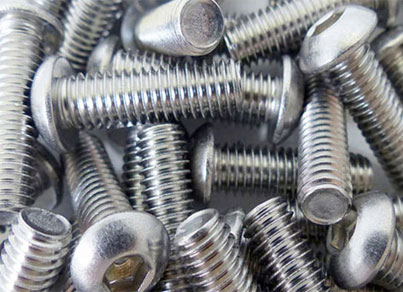
Super Duplex Fasteners
Super Duplex 2507 Fasteners belong to the super duplex grade of steels. They have the qualities of ferritic and austenitic steel grades. There are three different types of duplex steels as standard duplex, super duplex and lean duplex. As a leading Super Duplex Fasteners manufacturer we produce the fasteners in all types and dimensions available. The super duplex is used most next to the standard duplex. The Super Duplex 2507 Bolts are costlier than the standard duplex and other grades of steel types because of their composition.
The material has 25% chromium, 4% molybdenum and 7% nickel in the content. The Super Duplex Stainless Steel Bolts and Nuts have very high corrosion resistance, especially the chloride ion corrosion cracking resistance. They are also resistant to pitting and crevice attack. Due to these qualities, the Super Duplex 2507 Hex Bolts are suitable for marine, sea water, brackish water applications such as water desalination plants. Other applications include flue gas scrubbing equipment, pulp and paper industrial applications, offshore oil drilling and production.
The Alloy 2507 Screws are used only with tools to drive them in and do not require nuts to hold them in place. The screws come in different thicknesses, lengths and screw types depending on the specifications and application types. The super duplex 2507 Stud Bolts can be used under high temperature, high pressure and extremely corrosive environments. Please contact us to know more about the dimensions, prices and shipping of the Super Duplex Threaded Rod and other super duplex fasteners.
| Specification | EN Standard | Grade | Chemical Composition | Description |
|---|---|---|---|---|
| Super Duplex 2507 | EN 1.4410 | UNS S32750 | Ni: 7.0-8.0%, Cr: 24.0-26.0%, Mo: 3.0-5.0%, Fe: Balance, C: 0.03% max, N: 0.2-0.3% | High-strength, corrosion-resistant alloy with excellent resistance to pitting and crevice corrosion. Used in petrochemical and marine applications. |
| Super Duplex 2707 | EN 1.4547 | UNS S32760 | Ni: 8.0-9.0%, Cr: 25.0-27.0%, Mo: 4.0-6.0%, Fe: Balance, C: 0.03% max, N: 0.2-0.3% | Higher corrosion resistance than 2507, especially in acidic environments. Used in chemical processing and marine industries. |
| Super Duplex 2304 | EN 1.4362 | UNS S32304 | Ni: 4.0-6.0%, Cr: 23.0-26.0%, Mo: 0.0%, Fe: Balance, C: 0.03% max, N: 0.10-0.20% | Lower alloyed Super Duplex with good corrosion resistance and high strength. Suitable for general-purpose use in corrosive environments. |
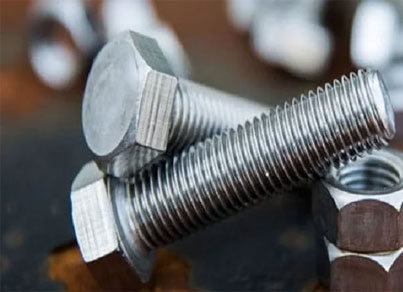
Duplex Fasteners
Duplex 2205 Fasteners are made up of a steel grade that is cost effective, long lasting and corrosion resistant. The grade of steel used for fastener manufacturing can range as ferritic, austenitic or duplex. Micro Metals is a leading Duplex Fasteners manufacturer and supplier. The duplex material has the strength qualities of the ferritic steel types and the corrosion resistant qualities of the austenitic steel types.
The Duplex 2205 Bolts belong to the most used of duplex steel grade. These are called standard duplex steel fasteners. The fasteners differ in type as studs, bolts, nuts, screws and many others. The Duplex Stainless Steel Fasteners are used in chemical processing, transport, storage, oil and gas, marine, paper and pulp, liquor and many other industries. The wider application range is possible because of the combination of corrosion resistance, high temperature capabilities with high pressure resistance of the Duplex Steel 2205 Nuts and Bolts.
The standard duplex material is made up of 22% chromium, 4.5% nickel, 3% molybdenum, manganese, silicon, nitrogen, phosphorus, carbon and sulfur in the composition. The Duplex Steel 2205 Screws and other fasteners have up to 97ksi minimum yield strength and up to 131ksi minimum tensile strength. The strength of the Duplex 2205 Hex Bolts is almost double that of the austenitic grade steel bolts. They have higher mechanical properties so that the 1.4462 Alloy 2205 Stud Bolt and other types can come under different specifications such as ASME SA 182, 240, 479, 789 and so on. Please direct your inquiries on any information about the different types such as the Duplex Steel Bolts and screws towards us
| Specification | EN Standard | Grade | Chemical Composition | Description |
|---|---|---|---|---|
| Duplex 2205 | EN 1.4462 | UNS S32205 | Ni: 4.5-6.5%, Cr: 21.0-23.0%, Mo: 2.5-3.5%, Fe: Balance, C: 0.03% max, N: 0.08-0.20% | Common duplex stainless steel with excellent resistance to stress corrosion cracking and high strength. Used in oil and gas, and chemical processing. |
| Duplex 2507 | EN 1.4410 | UNS S32750 | Ni: 7.0-8.0%, Cr: 24.0-26.0%, Mo: 3.0-5.0%, Fe: Balance, C: 0.03% max, N: 0.2-0.3% | High-strength duplex stainless steel with exceptional resistance to pitting and crevice corrosion. Used in harsh environments like offshore and chemical industries. |
| Duplex 2304 | EN 1.4362 | UNS S32304 | Ni: 4.0-6.0%, Cr: 23.0-26.0%, Mo: 0.0%, Fe: Balance, C: 0.03% max, N: 0.10-0.20% | Lower alloyed duplex steel with good general corrosion resistance and high strength. Suitable for less aggressive environments. |
| Duplex 2207 | EN 1.4463 | UNS S32101 | Ni: 4.0-6.0%, Cr: 21.0-23.0%, Mo: 1.0-1.5%, Fe: Balance, C: 0.03% max, N: 0.10-0.20% | Enhanced duplex stainless steel with improved resistance to chloride stress corrosion cracking. Used in marine and chemical processing industries. |
| Duplex 2301 | EN 1.4162 | UNS S31803 | Ni: 4.5-6.5%, Cr: 21.0-23.0%, Mo: 1.5-2.5%, Fe: Balance, C: 0.03% max, N: 0.10-0.20% | General-purpose duplex stainless steel with good resistance to pitting and crevice corrosion. Suitable for a variety of industrial applications. |
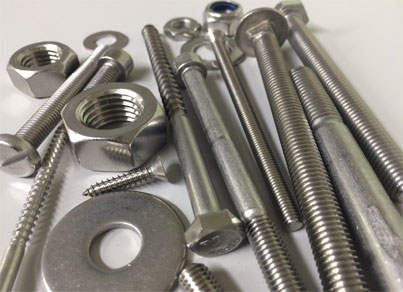
Stainless Steel Fasteners
Stainless Steel Fasteners Manufacturer in India as we know there are many manufacturer of stainless steel fasteners in all around the world buy India is one of the most popular country in the production as well as in the transportation of industrial products but our company is also very superior and one of the best among them. We are PED official manufacturer of Stainless Steel Fasteners manufacturer in India. Stainless steel grade 304 bolts and Nuts also known as 304 stainless steel Oceangoing Fastener due to its improved resistance to chloride oxidization.
Type 304 Stainless Steel Fasteners series is made up of almost 18% chromium and 8% nickel. These fastenings, which also include the 302, 302HQ, 303 and 305, are considered by several variables and grades with a close biochemical arrangement
| Specification | EN Standard | Grade | Chemical Composition | Description |
|---|---|---|---|---|
| Stainless Steel 304 | EN 1.4301 | UNS S30400 | Ni: 8.0-10.5%, Cr: 18.0-20.0%, Fe: Balance, C: 0.08% max, Mn: 2.0%, Si: 1.0% max | General-purpose stainless steel with good corrosion resistance and formability. Widely used in kitchen appliances and structural components. |
| Stainless Steel 316 | EN 1.4401 | UNS S31600 | Ni: 10.0-14.0%, Cr: 16.0-18.0%, Mo: 2.0-3.0%, Fe: Balance, C: 0.08% max, Mn: 2.0%, Si: 1.0% max | Superior corrosion resistance compared to 304, especially in chloride environments. Used in marine, chemical, and medical applications. |
| Stainless Steel 316L | EN 1.4404 | UNS S31603 | Ni: 12.0-15.0%, Cr: 16.0-18.0%, Mo: 2.0-3.0%, Fe: Balance, C: 0.03% max, Mn: 2.0%, Si: 1.0% max | Low-carbon version of 316 with excellent corrosion resistance and weldability. Used in chemical processing and marine environments. |
| Stainless Steel 304L | EN 1.4307 | UNS S30403 | Ni: 8.0-12.0%, Cr: 18.0-20.0%, Fe: Balance, C: 0.03% max, Mn: 2.0%, Si: 1.0% max | Low-carbon version of 304 with enhanced weldability and corrosion resistance. Suitable for applications requiring welding. |
| Stainless Steel 321 | EN 1.4541 | UNS S32100 | Ni: 9.0-12.0%, Cr: 17.0-19.0%, Ti: 5xC% min, Fe: Balance, C: 0.08% max | Stabilized with titanium for better high-temperature performance and resistance to intergranular corrosion. Used in high-temperature applications. |
| Stainless Steel 347 | EN 1.4550 | UNS S34700 | Ni: 9.0-13.0%, Cr: 17.0-19.0%, Nb: 10xC% min, Fe: Balance, C: 0.08% max | Stabilized with niobium for excellent resistance to intergranular corrosion and high-temperature stability. Used in aerospace and chemical processing. |
| Stainless Steel 904L | EN 1.4539 | UNS N08904 | Ni: 23.0-25.0%, Cr: 19.0-21.0%, Mo: 4.0-5.0%, Cu: 1.0-2.0%, Fe: Balance, C: 0.02% max | High-alloy stainless steel with exceptional resistance to acid corrosion and pitting. Used in highly corrosive environments like chemical processing and marine applications. |
| Stainless Steel 304H | EN 1.4948 | UNS S30409 | Ni: 8.0-11.0%, Cr: 18.0-20.0%, Fe: Balance, C: 0.04-0.10%, Mn: 2.0%, Si: 1.0% max | High-carbon version of 304 for better strength at high temperatures. Used in high-temperature applications. |
| Stainless Steel 309 | EN 1.4828 | UNS S30900 | Ni: 12.0-15.0%, Cr: 22.0-24.0%, Fe: Balance, C: 0.20% max, Mn: 2.0%, Si: 1.0% max | High-temperature stainless steel with good oxidation resistance. Used in furnace parts, heat exchangers, and high-temperature containers. |
| Stainless Steel 309S | EN 1.4833 | UNS S30908 | Ni: 12.0-15.0%, Cr: 22.0-24.0%, Fe: Balance, C: 0.08% max, Mn: 2.0%, Si: 1.0% max | Lower carbon version of 309 with better weldability. Used in similar high-temperature applications as 309. |
| Stainless Steel 309H | EN 1.4833 | UNS S30909 | Ni: 12.0-15.0%, Cr: 22.0-24.0%, Fe: Balance, C: 0.04-0.10%, Mn: 2.0%, Si: 1.0% max | High-carbon version of 309 for better strength at high temperatures. Used in high-temperature applications. |
| Stainless Steel 310 | EN 1.4845 | UNS S31000 | Ni: 19.0-22.0%, Cr: 24.0-26.0%, Fe: Balance, C: 0.25% max, Mn: 2.0%, Si: 1.5% max | High-temperature stainless steel with good oxidation resistance and high strength. Used in furnace parts, heat exchangers, and high-temperature applications. |
| Stainless Steel 310S | EN 1.4845 | UNS S31008 | Ni: 19.0-22.0%, Cr: 24.0-26.0%, Fe: Balance, C: 0.08% max, Mn: 2.0%, Si: 1.5% max | Lower carbon version of 310 with better weldability. Used in similar high-temperature applications as 310. |
| Stainless Steel 310H | EN 1.4845 | UNS S31009 | Ni: 19.0-22.0%, Cr: 24.0-26.0%, Fe: Balance, C: 0.04-0.10%, Mn: 2.0%, Si: 1.5% max | High-carbon version of 310 for better strength at high temperatures. Used in high-temperature applications. |
| Stainless Steel 316Ti | EN 1.4571 | UNS S31635 | Ni: 10.0-14.0%, Cr: 16.5-18.5%, Mo: 2.0-3.0%, Ti: 5xC% min, Fe: Balance, C: 0.08% max | Similar to 316 with added titanium for improved resistance to intergranular corrosion. Used in chemical processing and high-temperature applications. |
| Stainless Steel 316H | EN 1.4919 | UNS S31609 | Ni: 10.0-14.0%, Cr: 16.0-18.0%, Mo: 2.0-3.0%, Fe: Balance, C: 0.04-0.10%, Mn: 2.0%, Si: 1.0% max | High-carbon version of 316 for better strength at high temperatures. Used in high-temperature applications. |
| Stainless Steel 316LN | EN 1.4429 | UNS S31653 | Ni: 10.0-14.0%, Cr: 16.0-18.0%, Mo: 2.0-3.0%, N: 0.10-0.16%, Fe: Balance, C: 0.03% max, Mn: 2.0%, Si: 1.0% max | Similar to 316L with added nitrogen for improved strength and corrosion resistance. Used in chemical processing and marine environments. |
| Stainless Steel 317 | EN 1.4449 | UNS S31700 | Ni: 11.0-15.0%, Cr: 18.0-20.0%, Mo: 3.0-4.0%, Fe: Balance, C: 0.08% max, Mn: 2.0%, Si: 1.0% max | Higher molybdenum content for improved corrosion resistance. Used in chemical processing and paper mill equipment. |
| Stainless Steel 317L | EN 1.4438 | UNS S31703 | Ni: 11.0-15.0%, Cr: 18.0-20.0%, Mo: 3.0-4.0%, Fe: Balance, C: 0.03% max, Mn: 2.0%, Si: 1.0% max | Low-carbon version of 317 with enhanced corrosion resistance and weldability. Used in chemical processing and marine environments. |
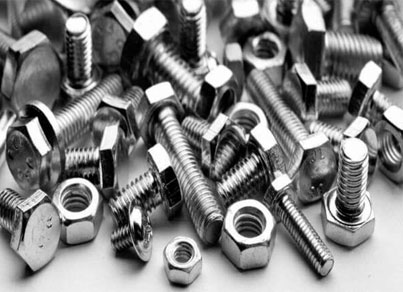
Alloy Steel Fasteners
The primary reason that has businesses choose using alloy steel over carbon steel grades is that their properties are noticeably higher. Unlike carbon steels, which provide the user with minimum to no corrosion resistance properties, Alloy Steel Fasteners Manufacturers In India recommend using steels belonging to this category, simply because their properties are better. Though in comparison the cost of using Alloy Steel Bolts for these applications makes the overall cost a little higher, the improvement of the properties makes it worth it.
Along with being tough, the Alloy Steel Stud Bolts generally display good behaviour when exposed to both low as well as high temperature settings. They have a higher tolerance to oxidation. Some grades of Alloy Steel Nuts, depending on their chemistry, have very high tensile strength, some of which are even better than conventional stainless steel grades. Not only is the Alloy Steel Washers hard, but they also have better durability and are able to take high pressure loads, without the fear of failure.
Unlike carbon steels that are hard and brittle, these fasteners have some form of ductility, which is important, especially if they are under duress. A small amount of ductility enables the Alloy Steel Screws to expand to such a degree that it is able to cater to the application, without breaking.
| Specification | EN Standard | Grade | Chemical Composition | Description |
|---|---|---|---|---|
| Alloy Steel 4140 | EN 1.7225 | UNS G41400 | C: 0.38-0.43%, Cr: 0.80-1.10%, Mo: 0.15-0.25%, Mn: 0.75-1.00%, Si: 0.20-0.35% | Medium-carbon alloy steel with good strength, toughness, and wear resistance. Used in automotive and machinery applications. |
| Alloy Steel 4340 | EN 1.6511 | UNS G43400 | C: 0.38-0.43%, Cr: 0.70-0.90%, Mo: 0.15-0.25%, Ni: 1.65-2.00%, Mn: 0.60-0.80%, Si: 0.20-0.35% | High-strength alloy steel with good fatigue resistance and toughness. Commonly used in aerospace and automotive components. |
| Alloy Steel 8620 | EN 1.6523 | UNS G86200 | C: 0.18-0.23%, Cr: 0.60-0.90%, Mo: 0.15-0.25%, Ni: 0.40-0.60%, Mn: 0.60-0.90% | Low-carbon alloy steel with good hardenability and wear resistance. Used in gears, shafts, and automotive components. |
| Alloy Steel 52100 | EN 1.3505 | UNS G52100 | C: 0.98-1.10%, Cr: 1.30-1.60%, Mn: 0.25-0.45%, Si: 0.10-0.30% | High-carbon chromium alloy steel with excellent hardness and wear resistance. Commonly used for bearings and high-stress components. |
| Alloy Steel 4130 | EN 1.7218 | UNS G41300 | C: 0.28-0.33%, Cr: 0.70-0.90%, Mo: 0.15-0.25%, Mn: 0.60-0.90%, Si: 0.15-0.35% | Low-alloy steel with good weldability and strength. Used in aerospace, automotive, and structural applications. |
| Alloy Steel 6150 | EN 1.7211 | UNS G61500 | C: 0.50-0.55%, Cr: 0.80-1.20%, Mo: 0.15-0.25%, Mn: 0.60-0.90%, Si: 0.15-0.35% | Medium-carbon alloy steel with good toughness and high tensile strength. Suitable for high-stress applications like automotive springs and axles. |
| Alloy Steel 4330 | EN 1.6511 | UNS G43300 | C: 0.28-0.33%, Cr: 0.80-1.10%, Mo: 0.15-0.25%, Ni: 1.65-2.00%, Mn: 0.60-0.80%, Si: 0.20-0.35% | High-strength low-alloy steel with good toughness and fatigue resistance. Used in heavy machinery and aerospace components. |
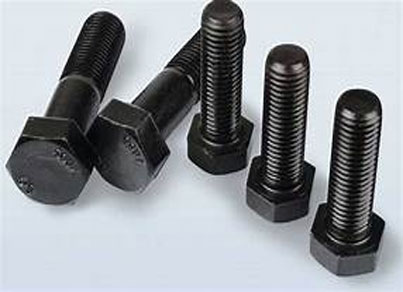
Carbon Steel Fasteners
Carbon Steel Anchor Fasteners are covered by ASTM A194 are designed to withstand being used in applications involving both high temperature and high pressure. Which is why per the specification the ASTM A194 Carbon Steel Hexagon Nuts are required to conform to the chemistry in addition to the test results.
The tests subjected to the Carbon Steel Industrial fasteners include hardness tests, cone proof load tests as well as proof of load tests. In order to improve the corrosion resistance properties of the Carbon steel Tooth Lock Washer, they are often galvanized. The thick coat of zinc applied on the carbon steel galvanised dash fastener improves their corrosion resistance properties in the presence of corrosive media, especially since carbon steels have poor resistance to corrosion.
Carbon Steel Fasteners Manufacturers recommend these fasteners to industries that prioritize the economics of the application rather than the longevity of the equipment used. However, this being said, one of the main advantages of using Carbon Steel Hex Domed Cap Nuts is their high toughness and hardness properties. These properties give the Carbon Steel Hex Head Screw an edge in sectors such as oil and gas as well as the petrochemical industry, where they are in high demand.
| Specification | EN Standard | Grade | Chemical Composition | Description |
|---|---|---|---|---|
| Carbon Steel C45 | EN 1.0503 | UNS G10450 | C: 0.42-0.50%, Mn: 0.50-0.80%, Si: 0.10-0.40%, P: 0.035% max, S: 0.035% max | Medium-carbon steel with good wear resistance and machinability. Used in shafts, gears, and bolts. |
| Carbon Steel C35 | EN 1.0501 | UNS G10350 | C: 0.32-0.38%, Mn: 0.60-0.90%, Si: 0.10-0.40%, P: 0.035% max, S: 0.035% max | Low-carbon steel with good machinability and weldability. Used in general engineering applications. |
| Carbon Steel C60 | EN 1.0601 | UNS G10600 | C: 0.55-0.65%, Mn: 0.60-0.90%, Si: 0.10-0.40%, P: 0.035% max, S: 0.035% max | High-carbon steel with high strength and hardness. Suitable for tools, springs, and high-stress components. |
| Carbon Steel C20 | EN 1.0402 | UNS G10200 | C: 0.17-0.22%, Mn: 0.40-0.70%, Si: 0.10-0.40%, P: 0.035% max, S: 0.035% max | Very low-carbon steel with good weldability and machinability. Used in automotive and structural applications. |
| Carbon Steel C50 | EN 1.0511 | UNS G10500 | C: 0.47-0.55%, Mn: 0.50-0.80%, Si: 0.10-0.40%, P: 0.035% max, S: 0.035% max | Medium-carbon steel with good hardness and strength. Used for components requiring high tensile strength. |
| Carbon Steel S45C | EN 1.1191 | UNS G10450 | C: 0.42-0.50%, Mn: 0.60-0.90%, Si: 0.10-0.35%, P: 0.035% max, S: 0.035% max | Similar to C45, but often used in a normalized condition. Provides improved toughness and wear resistance. |
| Carbon Steel S50C | EN 1.1210 | UNS G10500 | C: 0.47-0.55%, Mn: 0.60-0.90%, Si: 0.15-0.35%, P: 0.035% max, S: 0.035% max | High-carbon steel used for components requiring high strength and wear resistance. Suitable for tools and machinery. |
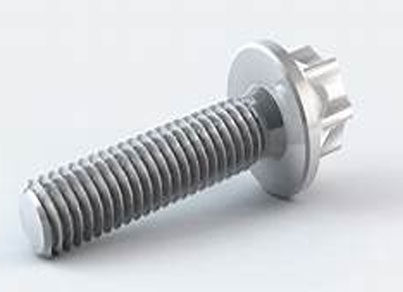
Aluminum Fasteners
Aluminum is known for its low density, making aluminum fasteners significantly lighter than steel or other metal counterparts. This characteristic is particularly advantageous in applications where weight is a concern, such as aerospace and automotive industries.
Aluminum naturally forms a protective oxide layer when exposed to oxygen, providing excellent corrosion resistance. However, aluminum fasteners may still corrode in certain environments, especially in the presence of saltwater or acidic conditions.
Aluminum is non-magnetic, which can be advantageous in applications where magnetic interference needs to be minimized, such as in electronic devices.
| Specification | EN Standard | Grade | Chemical Composition | Description |
|---|---|---|---|---|
| Aluminum 1050 | EN 1.0240 | UNS A91050 | Al: 99.5% min, Fe: 0.40%, Cu: 0.05%, Mn: 0.05%, Si: 0.25%, Zn: 0.10%, Mg: 0.05% | Commercially pure aluminum with excellent corrosion resistance and good workability. Used in chemical and food processing. |
| Aluminum 6061 | EN 1. alloy | UNS A96061 | Al: Balance, Si: 0.40-0.80%, Fe: 0.70%, Cu: 0.15-0.40%, Mn: 0.15%, Mg: 0.80-1.20%, Cr: 0.04-0.35%, Zn: 0.25% max, Ti: 0.15% max | Versatile aluminum alloy with good mechanical properties and excellent corrosion resistance. Used in aerospace, automotive, and structural applications. |
| Aluminum 7075 | EN 1. ZT62 | UNS A97075 | Al: Balance, Zn: 5.1-6.1%, Cu: 1.2-1.8%, Mg: 2.1-2.9%, Cr: 0.18-0.28%, Mn: 0.3% max, Si: 0.40% max | High-strength aluminum alloy with excellent fatigue resistance. Used in aerospace, military, and high-stress applications. |
| Aluminum 2024 | EN 1. 7XXX | UNS A92024 | Al: Balance, Cu: 3.8-4.9%, Mn: 0.3-0.9%, Mg: 1.2-1.8%, Cr: 0.1-0.4%, Si: 0.5% max | High-strength aluminum alloy with good fatigue resistance. Primarily used in aerospace and military applications. |
| Aluminum 5083 | EN 1. 8XXX | UNS A95083 | Al: Balance, Mg: 4.0-4.9%, Mn: 0.70-1.0%, Cr: 0.05-0.25%, Fe: 0.40% max, Si: 0.40% max | Marine-grade aluminum with excellent corrosion resistance and strength. Used in shipbuilding and offshore applications. |
| Aluminum 3003 | EN 1. 3XXX | UNS A93003 | Al: Balance, Mn: 1.0-1.5%, Cu: 0.05-0.20%, Fe: 0.70%, Si: 0.60%, Zn: 0.10% max | Good corrosion resistance and formability. Commonly used in chemical equipment, cooking utensils, and storage tanks. |
| Aluminum 4045 | EN 1.4XXX | UNS A94045 | Al: Balance, Cu: 5.0-6.0%, Si: 0.4-0.6%, Fe: 0.5% max, Mn: 0.4% max, Mg: 0.3% max | Good thermal conductivity and corrosion resistance. Often used in automotive heat exchangers and radiators. |
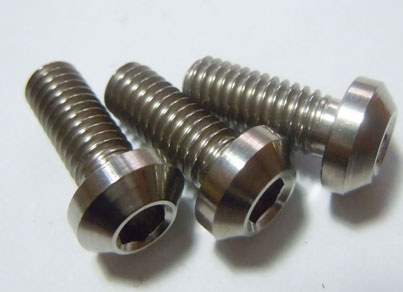
Titanium Fasteners
The mechanical properties of titanium will vary depending on the grade used. For instance, Titanium Bolts And Fasteners produced from alloys grade 1, grade 2, grade 3 and grade 4 are referred to as commercially pure titanium grades. Whereas the alloys after grade 5 Titanium 12 Point Bolts have different elements added in the alloy, thus improving some of its characteristics. Commonly, Titanium Socket Head Cap Screws and above are alloyed with elements such as aluminium, vanadium molybdenum, manganese and iron. Titanium Grade 2 Fasteners, which are referred to as a commercially pure titanium grade is heat resistant and exhibit good formability as well as superior corrosion resistance properties.
Titanium Grade 5 Hex Head Bolt is also known by its trade name as 6AL-4V. Grade 5 Aerospace Titanium Fasteners are a titanium alloyed product that contains about 6% Aluminum along with 4% Vanadium. Grade 5 Ti Threaded Stud Bolt is a medium strength product. Apart from their high tensile strength property and density ratio, the corrosion resistant Titanium Aircraft Fasteners have the ability to withstand moderately high temperatures without becoming susceptible to creeping.
| Specification | EN Standard | Grade | Chemical Composition | Description |
|---|---|---|---|---|
| Titanium Grade 1 | EN 3.7025 | UNS R50250 | Ti: Balance, O: 0.18% max, Fe: 0.20% max, N: 0.03% max, C: 0.08% max, H: 0.015% max | Commercially pure titanium with excellent corrosion resistance and high formability. Used in chemical processing and aerospace applications. |
| Titanium Grade 2 | EN 3.7035 | UNS R50400 | Ti: Balance, O: 0.25% max, Fe: 0.30% max, N: 0.03% max, C: 0.10% max, H: 0.015% max | Similar to Grade 1 but with slightly higher strength. Commonly used in marine, chemical, and aerospace industries. |
| Titanium Grade 3 | EN 3.7055 | UNS R50550 | Ti: Balance, O: 0.35% max, Fe: 0.30% max, N: 0.03% max, C: 0.10% max, H: 0.015% max | Provides higher strength compared to Grade 1 and Grade 2. Suitable for applications requiring higher strength and moderate formability. |
| Titanium Grade 4 | EN 3.7065 | UNS R50700 | Ti: Balance, O: 0.40% max, Fe: 0.40% max, N: 0.03% max, C: 0.10% max, H: 0.015% max | The strongest of the commercially pure grades, offering good corrosion resistance and strength. Used in aerospace and medical applications. |
| Titanium Grade 5 | EN 3.7165 | UNS R56400 | Ti: Balance, Al: 4.0-4.5%, V: 3.5-4.5%, Fe: 0.40% max, O: 0.20% max, C: 0.08% max, N: 0.05% max | The most commonly used titanium alloy with excellent strength-to-weight ratio and corrosion resistance. Used in aerospace, automotive, and marine applications. |
| Titanium Grade 9 | EN 3.7165 | UNS R56320 | Ti: Balance, Al: 3.0-3.5%, V: 2.5-3.0%, Fe: 0.30% max, O: 0.20% max, C: 0.10% max, N: 0.05% max | Alloyed with aluminum and vanadium for increased strength. Used in aerospace and high-performance applications. |
| Titanium Grade 23 | EN 3.7165 | UNS R56401 | Ti: Balance, Al: 6.0-7.0%, V: 4.0-4.5%, Fe: 0.40% max, O: 0.15% max, C: 0.08% max, N: 0.05% max | An improved version of Grade 5 with lower oxygen content, providing higher strength and better ductility. Often used in critical aerospace and medical applications. |
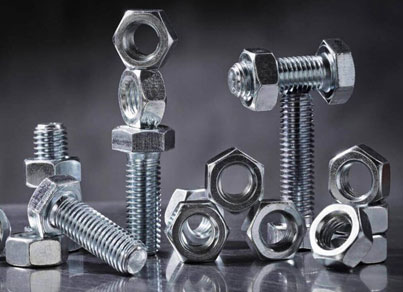
Nimonic Fasteners
Nimonic fasteners are high-performance fastening components made from Nimonic alloys, which are a group of nickel-based superalloys known for their exceptional high-temperature strength, corrosion resistance, and oxidation resistance.
High-Temperature Strength: Nimonic alloys exhibit excellent mechanical properties at elevated temperatures, making them suitable for applications in high-temperature environments such as gas turbines, aerospace propulsion systems, and industrial furnaces.
Corrosion and Oxidation Resistance: Nimonic alloys offer good resistance to corrosion and oxidation, even at high temperatures. This property makes Nimonic fasteners suitable for use in harsh and corrosive environments.
| Specification | EN Standard | Grade | Chemical Composition | Description |
|---|---|---|---|---|
| Nimonic 75 | EN 2.4969 | UNS N06075 | Ni: Balance, Cr: 20.0-23.0%, Co: 1.0-2.0%, Ti: 1.0-1.5%, Al: 0.5-1.0%, Fe: 5.0% max, C: 0.10% max | Nickel-chromium alloy with good oxidation resistance and high strength at elevated temperatures. Used in gas turbines and aerospace applications. |
| Nimonic 80A | EN 2.4952 | UNS N07080 | Ni: Balance, Cr: 19.0-21.0%, Co: 1.0-1.5%, Ti: 0.9-1.1%, Al: 1.0-1.5%, Fe: 2.5% max, C: 0.10% max | Improved version of Nimonic 75 with higher strength and better resistance to thermal creep. Suitable for high-temperature applications. |
| Nimonic 90 | EN 2.4964 | UNS N07090 | Ni: Balance, Cr: 19.0-21.0%, Co: 1.0-2.0%, Ti: 1.0-1.5%, Al: 1.0-1.5%, Fe: 5.0% max, C: 0.10% max | Similar to Nimonic 80A but with enhanced strength and fatigue resistance. Used in demanding high-temperature applications. |
| Nimonic 263 | EN 2.4663 | UNS N07263 | Ni: Balance, Cr: 20.0-23.0%, Co: 10.0-12.0%, Mo: 2.0-3.0%, Ti: 0.5-1.0%, Al: 0.5-1.0%, Fe: 1.5% max, C: 0.08% max | High-strength, oxidation-resistant nickel-chromium-cobalt alloy. Used in gas turbines and other high-stress, high-temperature applications. |
| Nimonic 901 | EN 2.4665 | UNS N09901 | Ni: Balance, Cr: 15.0-17.0%, Co: 5.0-8.0%, Ti: 1.0-1.5%, Al: 2.5-3.0%, Mo: 2.5-3.0%, Fe: 4.0% max, C: 0.10% max | Nickel-chromium-cobalt alloy with high strength and excellent resistance to oxidation at elevated temperatures. Used in aerospace and power generation. |
| Nimonic 80A+ | EN 2.4952 | UNS N07080 | Ni: Balance, Cr: 19.0-21.0%, Co: 1.0-1.5%, Ti: 0.9-1.1%, Al: 1.0-1.5%, Fe: 2.5% max, C: 0.10% max | An enhanced version of Nimonic 80A with improved mechanical properties and better performance at high temperatures. Used in high-temperature engine components. |
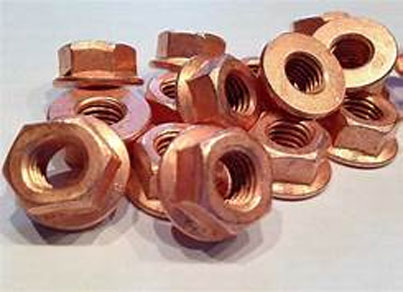
Copper Fasteners
Generally, the Copper Acorn and Coupling Nuts are used to fasten some areas of the boat or ship in order to improve its physical appearance. Aside from its physical appearance, the Copper Machine and Carriage Bolts exhibit good resistance to brine and saltwater, which indicates that they have a longer shelf life as they do not decay faster. Another reason why Copper Fasteners Manufacturers recommend using these fasteners in electronics is that copper is a metal that exhibits good conductivity to both heat and electricity, thus proving to be a useful component.
Furthermore, 110 Copper Threaded Rod has good bacteriostatic properties. Hence, after stainless steel grade 316, Copper Hex Bolts and Nuts are considered to be hygienic and therefore could be used in not only pharma industries, but also for the processing of food and beverage. Commercially pure Copper Bolts Nuts Washers are not only ductile and malleable, but they are also recyclable. Thus even defected fasteners such as the Copper Bolts And Nuts could be remelted and reused.
| Specification | EN Standard | Grade | Chemical Composition | Description |
|---|---|---|---|---|
| Copper C10100 | EN 2.0060 | UNS C10100 | Cu: 99.99% min, O: 0.02% max, Fe: 0.001% max, Pb: 0.001% max | High-purity copper with excellent electrical and thermal conductivity. Used in electrical components and heat exchangers. |
| Copper C10200 | EN 2.0065 | UNS C10200 | Cu: 99.95% min, O: 0.02% max, Fe: 0.005% max, Pb: 0.001% max | Similar to C10100 but with slightly lower purity. Used in applications requiring good conductivity and machinability. |
| Copper C11000 | EN 2.0090 | UNS C11000 | Cu: 99.90% min, O: 0.05% max, Fe: 0.02% max, Pb: 0.005% max | Electrolytic tough pitch copper with high electrical and thermal conductivity. Used in electrical wiring and industrial applications. |
| Copper C12200 | EN 2.0110 | UNS C12200 | Cu: 99.90% min, O: 0.02-0.05%, Fe: 0.02% max, Pb: 0.005% max | Oxygen-free copper with high ductility and good thermal conductivity. Used in high-strength and high-temperature applications. |
| Copper C44300 | EN 2.0550 | UNS C44300 | Cu: Balance, Zn: 30.0-40.0%, Pb: 0.05% max, Fe: 0.5% max | Brass with good corrosion resistance and strength. Used in marine and industrial applications. |
| Copper C70600 | EN 2.0872 | UNS C70600 | Cu: Balance, Ni: 9.0-11.0%, Fe: 0.5% max, Pb: 0.05% max | Copper-nickel alloy with excellent resistance to seawater corrosion. Used in marine and offshore applications. |
| Copper C71500 | EN 2.0895 | UNS C71500 | Cu: Balance, Ni: 11.0-13.0%, Fe: 0.5% max, Pb: 0.05% max | High-nickel copper alloy with improved strength and corrosion resistance. Used in industrial and marine environments. |
| Copper C26000 | EN 2.0430 | UNS C26000 | Cu: Balance, Zn: 70.0-80.0%, Pb: 0.05% max, Fe: 0.35% max | Brass with good machinability and strength. Used in plumbing fittings and mechanical components. |
| Copper C28000 | EN 2.0410 | UNS C28000 | Cu: Balance, Zn: 57.0-63.0%, Pb: 0.05% max, Fe: 0.35% max | High-strength brass with good corrosion resistance. Commonly used in valves, fittings, and other hardware. |
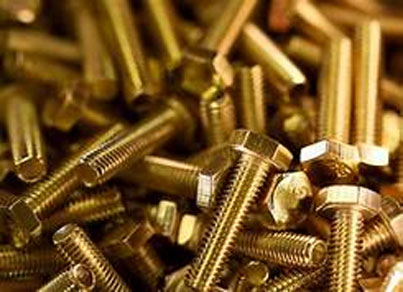
Brass Fasteners
Brass fasteners are popular fastening components made from brass, an alloy primarily composed of copper and zinc, with small amounts of other elements such as lead or tin.
Corrosion Resistance: Brass offers excellent corrosion resistance, making brass fasteners suitable for both indoor and outdoor applications. However, exposure to harsh chemicals or saltwater environments may cause corrosion over time.
Aesthetic Appeal: Brass has a golden-yellow color and a shiny surface finish, giving brass fasteners an attractive appearance. They are often used in applications where aesthetics are important, such as furniture, decorative hardware, and architectural fittings.
Low Friction: Brass has a low coefficient of friction, which reduces wear and tear on mating surfaces and facilitates smooth assembly and disassembly of fastened components.
| Specification | EN Standard | Grade | Chemical Composition | Description |
|---|---|---|---|---|
| Brass C26000 | EN 2.0430 | UNS C26000 | Cu: Balance, Zn: 70.0-80.0%, Pb: 0.05% max, Fe: 0.35% max | Known as "yellow brass," it has good strength and machinability. Commonly used in plumbing fittings and mechanical components. |
| Brass C28000 | EN 2.0410 | UNS C28000 | Cu: Balance, Zn: 57.0-63.0%, Pb: 0.05% max, Fe: 0.35% max | High-strength brass with good corrosion resistance. Often used in valves, fittings, and other hardware. |
| Brass C36000 | EN 2.0430 | UNS C36000 | Cu: Balance, Zn: 61.0-63.0%, Pb: 2.0-3.0%, Fe: 0.35% max | Known as "free-cutting brass" due to its excellent machinability. Widely used in precision machining applications. |
| Brass C46400 | EN 2.0910 | UNS C46400 | Cu: Balance, Zn: 60.0-63.0%, Pb: 1.0-2.0%, Fe: 0.30% max, Sn: 1.0-1.5% | Known as "naval brass," it offers excellent resistance to corrosion in marine environments. Used in shipbuilding and marine applications. |
| Brass C38500 | EN 2.0490 | UNS C38500 | Cu: Balance, Zn: 61.0-64.0%, Pb: 0.5-1.5%, Fe: 0.5% max | Provides good strength and corrosion resistance. Commonly used in automotive and general engineering applications. |
| Brass C33200 | EN 2.0415 | UNS C33200 | Cu: Balance, Zn: 85.0-90.0%, Pb: 2.0-3.0%, Fe: 0.5% max | Known for its excellent castability and machinability. Used in a variety of cast and forged components. |
| Brass C67800 | EN 2.0770 | UNS C67800 | Cu: Balance, Zn: 65.0-70.0%, Pb: 1.0-2.0%, Sn: 0.2-0.5%, Fe: 0.5% max | High-strength brass with good corrosion resistance. Suitable for applications requiring high strength and durability. |
| Brass C23000 | EN 2.0420 | UNS C23000 | Cu: Balance, Zn: 85.0-90.0%, Pb: 0.2% max, Fe: 0.3% max | Also known as "leaded brass," it has good machinability and is used in precision machined parts and fittings. |